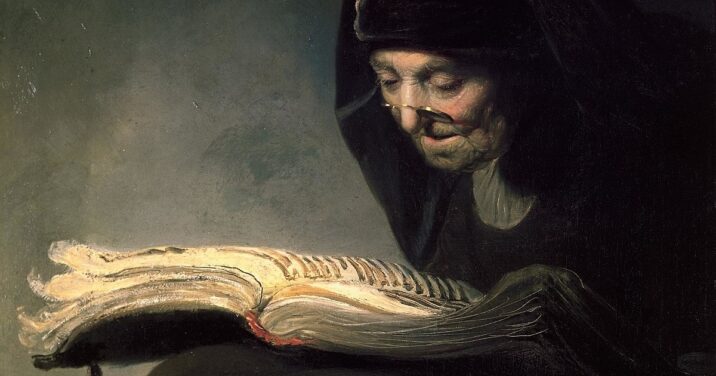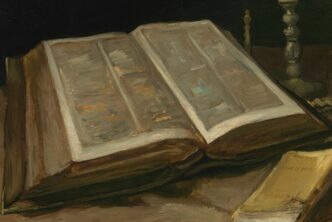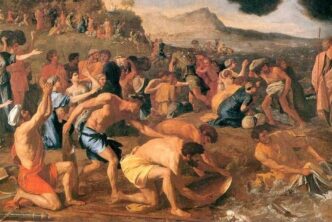Catholics love the Bible. From the Easter Sunday stroll on the road to Emmaus when the risen Jesus conducted the very first Christian Bible study—“he opened their minds to understand the Scriptures” (Luke 24:45)—to today, Christians have always been drawn to the Lord through the sacred page.
Catholics are conscious of abiding in a millennia-old tradition that is mediated by Jesus and moderated by the successors of the apostles, that is, the bishops. As the Second Vatican Council taught, “It is clear therefore that, in the supremely wise arrangement of God, sacred Tradition, Sacred Scripture, and the Magisterium of the Church are so connected and associated that one of them cannot stand without the others” (Dei Verbum 10).
Since the time of St. Jerome, the patron of Catholic Bible study, we have been told that ignorance of Scripture is ignorance of Christ.
How do Catholics encounter the Bible?
Catholics therefore do not study Scripture in a vacuum, but in a community of believers, in the apostolic tradition, from the heart of the Church. Catholics’ primary encounter with the Word is liturgical: the Bible is read aloud at Mass and in the Liturgy of the Hours.
Catholics enjoy a secondary encounter with the Word as it is explained in the liturgical homily by an ordained minister.
Thirdly, Catholics read and study the Bible in study groups, classes, and in private.
Before the modern rise in literacy, illiterate Catholics would be taught the Bible using stained glass windows or a picture book referred to as “The Bible of the Poor.”
Catholic monks preserved the sacred text through patient and loving copying throughout the generations, often pairing the biblical text with lavish illuminations as in the Book of Kells. As literacy began to rise with modernization, the invention of the printing press, and the Protestant Reformation, Catholic scholars set out to provide an English translation of the Bible, which came to be known by the names of the towns where these scholars had been exiled from England: the Douay-Rheims Bible.
What does the Catholic Church teach about Bible study?
Certain official Catholic documents guide and encourage the study of the Bible. Pope Pius XII wrote Divino Afflante Spiritu (1943) during World War II to encourage the growth of Catholic biblical scholarship.
The Second Vatican Council issued Dei Verbum (1965), the most authoritative document guiding the study of Scripture. It declares: “the study of the sacred page is, as it were, the soul of sacred theology” (Dei Verbum 24).
Additional guidance for Catholic Scripture study came in 1993 with the Pontifical Biblical Commission’s document, The Interpretation of the Bible in the Church.
The last major guiding document was Pope Benedict XVI’s encyclical, Verbum Domini (2010), which taught: “where exegesis is not theology, Scripture cannot be the soul of theology, and conversely, where theology is not essentially the interpretation of the Church’s Scripture, such a theology no longer has a foundation” (Verbum Domini 35). Catholic theology and Catholic Bible study go hand-in-hand.
How does the Catholic Church encourage Bible study?
Since the Second Vatican Council, the Catholic Church has sponsored multiple initiatives to encourage the study of the Bible.
First and foremost, the Council led to the revision of the Sunday Lectionary (1969), which dramatically expanded the amount of Scripture read aloud in the liturgy from the pre-conciliar one-year cycle to the current three-year cycle. In fact, this new Roman Lectionary became the basis for the widely ecumenical Revised Common Lectionary used in many Protestant congregations today.
The Catholic Church has also encouraged, and collaborated in, the production of new Bible translations since the Council. More recently, in 2019 Pope Francis inaugurated an annual “Sunday of the Word of God” that is dedicated to promoting biblical literacy among Catholics.
What makes Bible study “Catholic”?
Reading the Bible from the heart of the Church involves honoring the fact that there is only one “divine well-spring” of revelation, out of which flow both Sacred Scripture and Sacred Tradition (Verbum Domini 9). To read Scripture as a Catholic means embracing both Scripture and Tradition under the guidance of the living Magisterium, the bishops.
The 4 senses of Scripture
In terms of methods for Catholic Bible study, Catholics embrace the senses of Scripture, revealing that one passage can have more than one meaning. These senses are:
- Literal Sense: what the words mean
- Spiritual Sense: a deeper hidden meaning, which is divided into three sub-categories:
- Allegorical Sense: how biblical events foreshadow Christ
- Moral Sense: how biblical events teach us to live
- Anagogical Sense: how biblical events point to eschaton, the end of history
In fact, there is a little poem used to describe the senses:
The letter speaks of deeds; allegory about the faith;
The moral about our actions; anagogy about our destiny. (Verbum Domini 37)
While all four senses matter for Catholic faith, St. Thomas Aquinas teaches that the literal sense is the foundation of the other senses and that any legitimate theological argument must be drawn from it alone (Summa TheologicaI, q. 1, a. 10, ad 1).
Lectio divina
Catholics also believe in a prayerful reading of the sacred page called Lectio divina (“divine reading”). Lectio divina includes a series of steps that help the reader pray with Scripture:
- Lectio (“reading”): literally reading the text of Scripture, usually several times
- Meditatio (“meditation”): using the imagination to think about what was read
- Oratio (“prayer”): vocal prayer to God in response to the reading
- Contemplatio (“contemplation”): silent mental prayer of communion with God
This basic format leads a person from simple reading, through active reflection on the text, to vocal prayer, to the silent prayer of contemplation.
What are some Catholic Bible study programs?
- The Bible in a Year Podcastwith Fr. Mike Schmitz rose to prominence as the top podcast on the Apple podcast charts. In each episode, Fr. Schmitz reads a portion of Scripture aloud and then offers some reflections. It is the whole Bible in 365 episodes.
- Catholic Scripture Study International is a series of topical studies with study questions for use in group discussions.
- Come and See Catholic Bible Study is an introductory series that can be used in families, parish groups and other settings with step-by-step instructions, study questions and DVD presentations.
- The Great Adventure Bible Timeline is a comprehensive Genesis-to-Revelation study that comes in formats for adults, teens, and even children. It divides biblical history into distinct color-coded periods.
- Lectio from the Augustine Institute is a video Bible study series meant for groups available through the Formed.org platform, accompanied by substantial workbooks.
- Little Rock Scripture Study is a long-standing program with lots of resources for Bible study: a study Bible, 4–6 week format group studies, DVD series, and Lectionary studies.
- Six Weeks with the Bible from Loyola Press is a series of booklets that Bible study groups in Catholic settings can use together.
A ladder of Catholic Bible study resources
Catholics first encounter the Bible at Mass, but formally learn about it in catechism classes, Catholic school, and youth groups.
When first starting out on your journey of studying the Bible as a Catholic, it is best to find an organized group that uses a Bible study curriculum. In certain dioceses in the United States, you can find a Catholic biblical school that offers a robust multi-year program for coming to understand the whole Bible. Examples include the Denver Catholic Biblical School, the Catholic Bible Institute of Los Angeles, and the Catholic Biblical School of Michigan. Many parishes also offer Bible study classes and programs that help Catholics gain a foundational understanding of Scripture.
Once you find a context for learning about Scripture in a community, you’ll need some resources. I think of Bible study resources as a ladder from simple to complex, from introductory to advanced. You might start your journey with a Catholic study Bible, but then want something more in-depth like a commentary. Fortunately, there are plenty of resources for every level.
What are some Catholic study Bibles?
- The Catholic Study Bible (NABRE) includes Reading Guides, explanatory footnotes, cross-references, a glossary, and maps.
- The Didache Bible (RSV-2CE) is extensively linked to the Catechism of the Catholic Church; it includes maps, glossary, index, and explanations of common apologetic questions.
- The Great Adventure Catholic Bible (RSV-2CE) syncs with the Ascension Press Bible study curriculum, using the color-code system of the Great Adventure Bible Timeline. It includes articles, charts, key events, and cross-references.
- The Ignatius Catholic Study Bible (RSV-2CE) includes comprehensive introductions, notes, and cross-references, but only the New Testament is complete. The Old Testament has been released piecemeal in booklet form.
- The Little Rock Catholic Study Bible (NABRE) includes notes, maps, essays, articles, cross-references, and graphics with an appealing layout.
- The Word on Fire Bible (NRSV-CE) is a multi-volume resource with comments from Bishop Robert Barron that aims to inspire readers with the beauty of the Catholic tradition. It includes quotes from church fathers and saints, artwork, and inspirational photographs.
What is the goal of Catholic Bible study?
Catholics read the Bible for knowledge about the past. Christianity is a religion that makes historical claims, after all. That is why Pope Benedict will insist that “historical-critical exegesis and other recently-developed methods” are indispensable (Verbum Domini 32). Such methods help us gain better access to what the biblical writers meant in the context in which they were writing. Yet we would lose sight of the goal if we stopped with mere history.
Ultimately, Catholics read the Bible as a path to union with God. The Catholic Church thinks of reading Scripture as a form of prayer, of conversation with God. Pope Benedict XVI explained Bible study in this way: “In this dialogue with God we come to understand ourselves and we discover an answer to our heart’s deepest questions” (Verbum Domini 23).
While the Bible contains doctrine, history, poetry, prophecy, and prayer, the ultimate purpose of reading it, understanding it, and studying it is to know God.
While there are plenty of intellectual stopping points along the way, the journey of the mind to God in Bible study has a mystical destination. It is not just about answering curious questions about the ancient past, linguistics, and literary interpretation. It is about the spiritual future of the soul with God, aiming to “share in his own blessed life” (CCC 1).
What are some Catholic ommentaries?
- The Catholic Commentary on Sacred Scripture is multi-volume series that aims to support Catholic faith and life. It is designed for priests, preachers, teachers and Bible study leaders, serving up scholarship illumined by faith. (I’m one of the editors of the CCSS Old Testament series.)
- The International Bible Commentary is a fat book! This huge one-volume commentary was put together by a Catholic-heavy ecumenical team. It is designed for pastors and preachers.
- The Jerome Biblical Commentary for the Twenty-First Century is the most recent one-volume commentary on the whole Bible written by American Catholic scholars. It boasts a foreword written by Pope Francis himself!
- The Navarre Bible comes from Spain. It was a project commissioned by St. Josemaría Escrivá, the founder of the Catholic movement called Opus Dei.
- The New Collegeville Bible Commentary is a popular commentary written by Catholic experts in accessible language.
- The Paulist Biblical Commentary is a recent one-volume commentary on the whole Bible written by an impressive array of contemporary Catholic biblical scholars
- The Sacra Pagina Commentary is an academic New Testament commentary written by Catholic biblical scholars.
Catholic Commentary on Sacred Scripture | CCSS: New Testament Series (17 vols.)
Price: $190.19
3 principles for Catholic Bible study
The Second Vatican Council document Dei Verbum establishes three principles for Catholic study of Scripture:
1. Content and unity
Catholics read the Bible as Christian Scripture. That means all the books and all their parts should be thought of as a canonical unity. As Hugh of St. Victor says: “All divine Scripture is one book, and this one book is Christ, speaks of Christ and finds its fulfillment in Christ” (Verbum Domini 39). Only by reading the whole of Scripture as one can we perceive the one definitive Word of God, namely Christ.
2. Living tradition
Dei Verbum says that “The living tradition of the whole Church must be taken into account” (Dei Verbum 12) when we study Scripture. That means the Catholic interpreter considers the writings of the Fathers of the Church, the Doctors of the Church, the Ecumenical Councils, the Papal Magisterium, and the perennial teaching of the Church when interpreting Scripture. The Catholic exegete is conscious of being part of a tradition and community of interpreters.
3. Analogy of faith
This principle asserts that all reading and interpretation of the Bible should be done in coherence with the entirety of Christian faith. The analogia fidei is based on a phrase from Romans 12:6, where Paul teaches that prophecy should be practiced kata ten analogian tes pisteos,“according to the analogy of faith.”
Fathers and Doctors of the Church on Scripture
Familiarity with the Tradition of Christian interpretation of Scripture is necessary for Catholic exegesis. Here are some resources to help get to know that Tradition:
- Ancient Christian Commentary Series reads almost like a Christian Talmud, with short snippets from ancient Christian interpreters on every passage in the Bible.
- Ancient Christian Writers Series is a collection of English translations of early Church writings.
- The Church’s Bible is similar to the ACCS, but includes longer selections from early Christian writers.
- Catena Aurea of St. Thomas Aquinas is a compilation of early Church Fathers interpretations put together by St. Thomas Aquinas—a kind of medieval study Bible.
- The Doctors of the Church Collectionincludes many writings from the thirty-seven official “Doctors of the Church”: saints whose lives and writings have made a major contribution to Christian teaching.
- The Fathers of the Church series from Catholic University of America Press is a vast series of English translations of the writings of the Fathers that has been going strong for well over a hundred volumes—and no signs of stopping.
- St. Thomas Aquinas’ Commentaries are making their way into English translation and are valuable for gaining a richly theological perspective on Scripture from the Angelic Doctor himself.
The Fathers of the Church with Shorter Works and Medieval Continuations (163 Vols.)
Price: $3,265.08
In community, under authority
While Protestant groups tend toward doctrines like sola scriptura (“Scripture alone”) and the “perspicuity” of the Bible (that its meaning is clear to the average Christian), the Catholic Church holds that to understand Scripture, we need to read it within the ancient tradition of Christian teaching and under the authority of the “living magisterium.”
What does that mean? At least two things:
1. Reading Scripture as a Catholic means not reading alone
That is, we read in concert with our brothers and sisters in Christ, in harmony with the Christian tradition, and in orientation toward the Liturgy. Private Bible reading at home is always connected with the public proclamation of Scripture at Mass. In fact, Catholics often study Scripture not book-by-book, but rather reading-by-reading as the Lectionary divvies up the sacred page.
Many Catholic Bible teachers put out commentaries and teachings on the readings in the Lectionary cycle. In short, Catholics read the Bible in community.
2. Catholics do not believe that the meaning of Scripture is “perspicuous”
Far from being accessible to anyone, Catholics believe rather that Scripture can be confusing and “hard to understand” (2 Pet 3:16). Because disputes about the meaning of Scripture arise, it is necessary for there to be an authoritative body to resolve disputes and discern what authentic Christian doctrine really is. This body is composed of the successors of the apostles: the bishops in communion with the pope. Catholics study the Bible under their authority.
What are some guides to Catholic Bible study?
- A Catholic Introduction to the Bible: The Old Testament by John Bergsma and Brant Pitre gives a thorough introduction to every book in the Old Testament, along with tables of Lectionary references, connections to the Christian interpretive tradition, and a bibliography for each book.
- Catholic Principles for Interpreting Scripture by Peter S. Williamson is a dissertation that expounds the Pontifical Biblical Commission’s 1993 document, “The Interpretation of the Bible in the Church,” and seeks to formulate applicable principles for Catholic interpretation.
- How Do Catholics Read the Bible?by Daniel J. Harrington, SJ, is a popular explanation of the Catholic approach to Scripture study.
- Praying Scripture for a Change: An Introduction to Lectio Divina by Tim Gray teaches people how to practice the ancient art of Lectio divina, a practice often encouraged by Catholic bishops.
- Holy People, Holy Land: A Theological Introduction to the Bible by Michael Dauphinais and Matthew Levering connects the dots between a faithful reading of the Bible and the Catholic theological tradition. It is a study of the Bible written by Thomistic theologians.
God’s word in human words
Catholics always privilege the Word Incarnate over the words of Scripture. Yes, the Bible is God’s word, but even more so God’s word points to the Word, that is, Jesus himself.
Taking for granted Catholics’ high regard for the Eucharist, Dei Verbum teaches that “The Church has always venerated the divine Scriptures as she venerates the body of the Lord” (Dei Verbum 21). Jesus the Word and the Bible as the Word are somehow inseparable. The document explains this so-called Incarnational Principle this way: “For the words of God, expressed in human language, have been made like human discourse, just as the word of the eternal Father, when He took to Himself the flesh of human weakness, was in every way made like men” (Dei Verbum 13). The Bible is thus sacramental. It conveys divine meaning through human means. The Bible brings us into contact with God as his eternal Word is disclosed in human language.
With so many resources, programs, Study Bibles, Commentaries, videos, and books available, Catholics have no excuse to not know their Bibles. The Second Vatican Council and the popes since have constantly encouraged Catholics to learn more about Scripture, to read the Bible and to dive deep into the sacred page. There is so much to learn!





